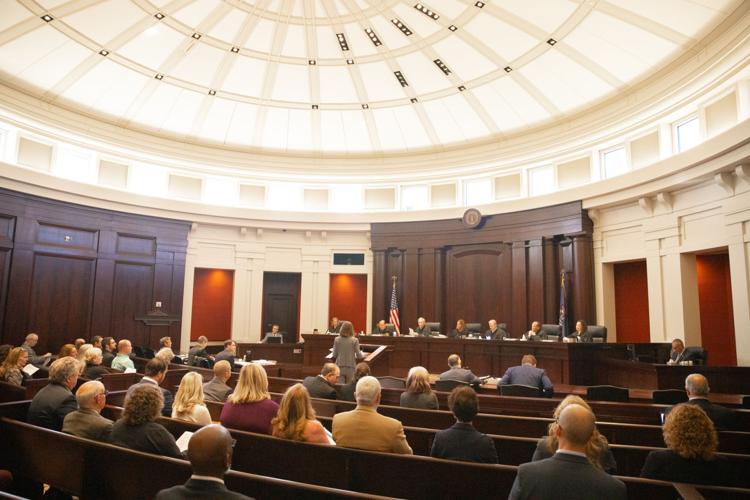Oakland County Treasurer Andrew Meisner under fire for foreclosure tactics

Michigan Supreme Court hearing oral arguments in Rafaeli v. Oakland County, Nov. 7, 2019.
(The Center Square) – Some Oakland County officials want answers from county Treasurer Andrew Meisner.
Oakland County Chairman David Woodward and commissioners Mike Gingell and Helen Zack sent a July 21 letter to Meisner, questioning his tax foreclosure practices condemned by the Michigan Supreme Court two weeks ago, The Detroit News reported.
“It appears your actions as Treasurer to foreclose on an Oakland County retiree’s property for $8.41 has exposed the county to serious risk,” the letter said.
Uri Rafaeli’s property was seized over an initial tax debt of $8.41, which grew to $285.81 after interest, penalties and fees.
Oakland County sold the property for $24,500 and then pocketed more than $24,000.
The Michigan Supreme Court ruled two weeks ago that withholding any surplus from tax-foreclosure sales that exceeded the amount owed constituted an “unconstitutional taking without just compensation.”
“Just as the Magna Carta protected property owners from uncompensated takings, it also recognized that tax collectors could only seize property to satisfy the value of the debt payable to the Crown, leaving the property owner with the excess,” Justice Brian K. Zahra wrote in the opinion.
Pacific Legal Foundation (PLF) attorneys who represented Rafaeli have estimated more than 100,000 similar property foreclosures in Michigan since 2002.
The Michigan Association of County Treasurers (MACT), which helped form the 1999 law known as Act 123, argued the foreclosure process was “a critical component of Michigan’s delinquent property tax collection process.”
The law allows a majority of Michigan’s counties to foreclose on a property with unpaid delinquent taxes and take it for public use or sell it to pay those property taxes, even if that debt is a few dollars.
There’s legislation in the Capitol that would reform Act 123, originally intended to speed up the rehabilitation of abandoned homes and prevent blight.
However, some argued the law did precisely the opposite.
Jerry Paffendorf, the CEO of Detroit-based mapping firm Loveland Technologies, told The Center Square that the law missed its first intentions.
“The law that was designed to decrease the amount of time that a property stayed vacant in certain communities was making thousands and tens of thousands of new vacant houses by taking properties away from people who were living in them,” Paffendorf said.
A Quicken Loans report of residents in 60,000 homes with delinquent taxes found the foreclosure practice may not prevent blight.
“In theory, the annual tax foreclosure auctions are intended to take properties that are neglected and not generating tax revenue, and sell them to owners who will pay taxes and put the properties to productive use,” the report said.
“In practice, most homes that face tax foreclosure never return to productive use. Instead, speculators who purchase cheap property at auction allow it to deteriorate without paying property taxes, leading to further depressed home values and blight.”
Much of the revenue from foreclosed home sales lined county coffers.
Wayne County has funneled more than $382 million in delinquent tax surpluses into its general fund budget since 2012, Bridge Magazine reported.
The letter informed Meisner the board created a committee to make recommendations to protect county taxpayers.
County Attorney John Bursch had previously estimated the court’s ruling could cost Michigan counties over $2 billion statewide.
According to the PLF, 12 other states, including Illinois, Wisconsin and Minnesota, allow for similar home foreclosure practices.

